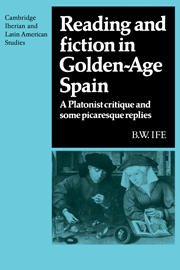Summary
This book has examined one of the factors which helped to determine the shape and form, the texture and feel of Spanish prose fiction in the Golden Age: the way that, consciously or not, certain writers wrote with half an eye to the critics who contended that fiction had a case to answer. These writers sought to locate the legitimacy of fiction precisely where the Platonist critics found it most wanting, in its ability to convince in spite of its falsehood, and in the complex responses that fiction calls forth from its readership. Where the Platonist critics found an alternative form of reality masquerading confusingly and compellingly as the real thing, the writers found an analogue of the moral and spiritual confusion in which lives are customarily lived. Where the critics saw readers fatally mesmerised, the writers found active participants involved in a degree of dialogue with the text that only silent private reading could have made possible.
If they had cared to look closely at any of the books discussed in chapter 4, or at any of the works of Cervantes – of whom the picaresque so often puts one in mind – critics of fiction would have found a sophisticated and convincing response to their case. They would have found a series of texts in which the practice of falsehood in its many forms becomes one of the major thematic considerations.
- Type
- Chapter
- Information
- Reading and Fiction in Golden-Age SpainA Platonist Critique and Some Picaresque Replies, pp. 172 - 173Publisher: Cambridge University PressPrint publication year: 1985



